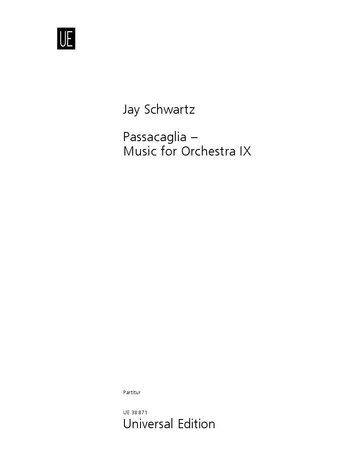

Jay Schwartz
Passacaglia – Music for Orchestra IX
Short instrumentation: 4 3 3 3 - 6 4 3 1 - perc, vln.I, vln.II, vla, vc, cb
Duration: 25'
Dedication: for Teo
Instrumentation details:
1st flute (+picc)
2nd flute (+picc)
3rd flute (+picc)
4th flute (+picc)
1st oboe
2nd oboe
3rd oboe (+c.a)
1st clarinet in Bb (+cl(Eb))
2nd clarinet in Bb (+cl(Eb))
3rd clarinet in Bb (+bass cl(Bb), cl(Eb))
1st bassoon
2nd bassoon
3rd bassoon (+cbsn)
1st horn in F
2nd horn in F
3rd horn in F
4th horn in F
5th horn in F
6th horn in F
1st trumpet in Bb
2nd trumpet in Bb
3rd trumpet in Bb
4th trumpet in Bb
1st trombone
2nd trombone
3rd trombone
tuba
percussion
violin I (desk 1–6)
violin I (mind. 16, max. 24 players)
violin II (mind. 14, max. 22 players)
viola (mind. 12, max. 20 players)
violoncello (mind. 10, max. 14 players)
double bass (mind. 8, max. 10 players)
Passacaglia – Music for Orchestra IX
Translation, reprints and more

Jay Schwartz
PassacagliaOrchestration: für Orchester
Type: Studienpartitur (Sonderanfertigung)
Work introduction
The composer Jay Schwartz, born and raised in California by German immigrants and who himself emigrated to Germany, and who sees himself as a „Wanderer“, a wayfarer, continues his orchestra series with a new creation for Teodor Currentzis and his Utopia Orchestra on the subject of the Wanderer, by musically commenting on the timeless problem of emigration, migration, of outsiderdom and the search for identity. By using Schubert’s timeless Journeyman theme, Schwartz brings Schubert’s isolation in his society into a contemporary context in the light of the role of the individual in the collective, between isolation and society.
A passacaglia, originally literally „to pass or cross the street,” represents a musical journey.
In Passacaglia - Music for Orchestra IX, the Wanderer appears from a Schubert song: Schwartz quotes seven measures and sends them on a journey twelve-fold through a network of seemingly endless glissandi - continuous sliding tones, the omnipresent characteristic of Schwartz's oeuvre.
Through the ancient Greek numeric context of the seven celestial bodies and the twelve astrological signs, an earthly journey becomes something otherworldly, which Schwartz in turn sees as pointing the way into inner spiritual space, a projection into the vast expanse and freedom of the spirit.
*Commissioned by Utopia Orchestra and the Schubert Projekt Fonds
